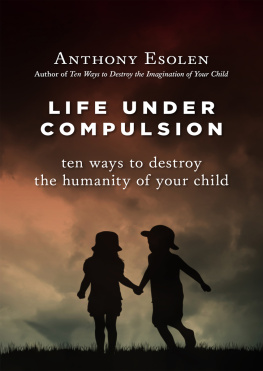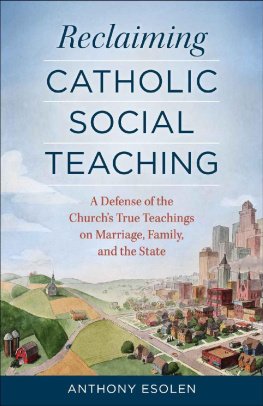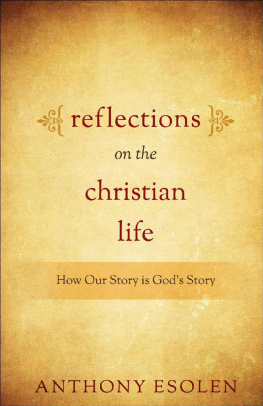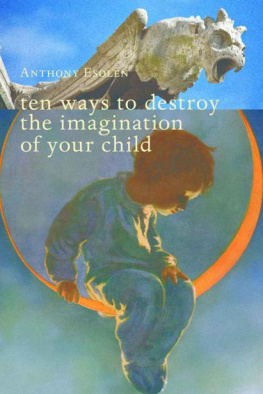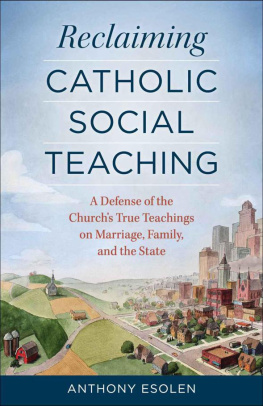Anthony Esolen - Angels, Barbarians, and Nincompoops
Here you can read online Anthony Esolen - Angels, Barbarians, and Nincompoops full text of the book (entire story) in english for free. Download pdf and epub, get meaning, cover and reviews about this ebook. year: 2017, publisher: TAN Books, genre: Detective and thriller. Description of the work, (preface) as well as reviews are available. Best literature library LitArk.com created for fans of good reading and offers a wide selection of genres:
Romance novel
Science fiction
Adventure
Detective
Science
History
Home and family
Prose
Art
Politics
Computer
Non-fiction
Religion
Business
Children
Humor
Choose a favorite category and find really read worthwhile books. Enjoy immersion in the world of imagination, feel the emotions of the characters or learn something new for yourself, make an fascinating discovery.

- Book:Angels, Barbarians, and Nincompoops
- Author:
- Publisher:TAN Books
- Genre:
- Year:2017
- Rating:3 / 5
- Favourites:Add to favourites
- Your mark:
- 60
- 1
- 2
- 3
- 4
- 5
Angels, Barbarians, and Nincompoops: summary, description and annotation
We offer to read an annotation, description, summary or preface (depends on what the author of the book "Angels, Barbarians, and Nincompoops" wrote himself). If you haven't found the necessary information about the book — write in the comments, we will try to find it.
Angels, Barbarians, and Nincompoops — read online for free the complete book (whole text) full work
Below is the text of the book, divided by pages. System saving the place of the last page read, allows you to conveniently read the book "Angels, Barbarians, and Nincompoops" online for free, without having to search again every time where you left off. Put a bookmark, and you can go to the page where you finished reading at any time.
Font size:
Interval:
Bookmark:


other words
you thought
you knew
Anthony Esolen
TAN Books
Charlotte, NC
Copyright 2017 Anthony Esolen
All rights reserved. With the exception of short excerpts used in critical review, no part of this work may be reproduced, transmitted, or stored in any form whatsoever, without the prior written permission of the publisher.
Cover design by David Ferris Design
Library of Congress Cataloging-in-Publication Data
Names: Esolen, Anthony M., author.
Title: Angels, barbarians, and nincompoops : and a lot of other
words you thought you knew / Anthony Esolen.
Description: Charlotte, North Carolina : TAN Books, [2017]
Identifiers: LCCN 2016055491 (print) | LCCN 2017002862 (ebook) |
ISBN 9781505108743 (hardcover) | ISBN 9781505108750 (ePub) |
ISBN 9781505108767 (Mobi)
Subjects: LCSH: Vocabulary. | English language--Glossaries,
vocabularies, etc.
Classification: LCC PE1449 .E85 2017 (print) | LCC PE1449
(ebook) | DDC 428.1--dc23
LC record available at https://lccn.loc.gov/2016055491
Published in the United States by
TAN Books
P. O. Box 410487
Charlotte, NC 28241
www.TANBooks.com
Printed and bound in the United States of America
Before and After
The following four quizzes are to be taken before and after reading the book. If you dont do better the second time than the first, you must buy a second copy of the book and take all four quizzes a third time. Answers are found at the back. Good luck!
Find the Oddball
In each of the following groups of three words, one of them is not etymologically related to the other two, even if they may mean the same thing. Can you guess which one? (Etymology is the study of the origin of words. We dont want anyone looking skyward and exclaiming, But none of these are insects!)
square, queer, quarter
daily, diurnal, Zeus
pork, farrow, swine
most, foremost, former
host, guest, ghost
foil, boil, bole
pastor, food, farmer
ring (on your finger), circle, round
war, guerilla, worth
communion, a, union
Fictionary
For each of the following, guess whether the suggested relation is genuine or a joke:
Too is related to to, because when you add something to a pile or a list, you add it to it.
Beyond the pale means you arent even pale anymore; you are a dead white.
Pulling out the stops means that you pull out all the knobs on a pipe organ, because when the knobs are in, they stop up the air.
Expect is related to expectorate, because you are hoping for something in your heart, that is, your chest.
Parchment is related to parch, because of the heating of the sheepskin required in its manufacture.
It likes me originally meant I like it.
Mart originally meant not the place where you bought something, but the cow you would buy.
Unkempt means that you arent kempt, that is, you havent combed your hair.
Prissy comes from pristine, with the sense of fussy neatness.
Sex is related to seek, for obvious reasons.
Antique, or Cheap Imitation?
Which of the following forms really used to be standard in English?
eat, past tense of eat, pronounced et
snuck, past tense of sneak
span, past tense of spin
kine, plural of cow
arn, instead of ran
brang, past tense of bring
busted, past tense of bust
grice, plural of grouse
ment, past tense of mend
lamben, plural of lamb
Youve Got to Be Kidding!
True or False:
Pirates outfielder Paul Waner was nicknamed Big Poison by a fan with a Brooklyn accent, who really meant Big Person.
A bum is so called because he has a fat one.
Anchors away should be anchors aweigh, meaning that you weigh or pull up the anchor.
A touchdown is so called because the player used to touch the football to the ground once he got to the end zone.
Jibber-jabber is what schoolboys used to call algebra when they didnt understand it.
You get the vapors because somebody has to get out the smelling salts to revive you.
A humorous person might be someone whose liver is producing an unusual amount of bile.
A pig in a poke was a piglet in a sack, all tied up.
To send something up the gut is like sending a ship into a narrow strait.
Ye is slang for you, by analogy with we.
Unless otherwise noted, Biblical quotations are from the Douay-Rheims Bible. The King James version is used where its masterly English is essential for my purposes. Where Biblical citations are noted in parentheses using the term see, the scripture verse in question was recalled or paraphrased.
The passages from Dante are my own translations as they appear in the Inferno, Purgatory, and Paradise published by Modern Library (Translation, introduction, and notes copyright 2002, 2003, 2004 respectively by Random House, Inc.).
With apologies to the great Mortimer Adler and his more ambitious tome entitled How To Read A Book (A in the sense of any or every . The bold A is our own for emphasis; we dont think it appears in Adlers title), we offer our readers these more humble instructions with regards to this book. Dont do it all at once. Linger over it. Peruse it at your leisure. Read the entries one per day if you like, perhaps while engaging in a daily activity, such as, well, brushing your teeth. And, to help you derive the most enjoyment and erudition, both philological and theological, therefrom, we offer the following law to bear in mind. Trust us it comes up a lot.
Yes, its the Jakob Grimm of the Fairy Tales. The Law says: Thou shalt not enter a gingerbread house. Actually, it doesnt say that. It is a law associating consonants in the Germanic languages with consonants in Proto-Indo-European, which was the language that Proto-Indo-Europeans spoke, our ancestors from the steppes of Eurasia. Those ancestors of ours were an energetic bunch. They fanned out everywhere, north, west, and south, and ended up in places where we might not think we had any relations. The people of Iran do not speak an Arabic language, and the people of India do not speak an Indo-Chinese language: Iranians speak Farsi, a distant cousin of English, and Indians speak Bengali, same thing. Anyway, to give one example, Grimms Law tells us that if we have a Germanic word beginning with h, we should look for a Latin or Greek word beginning with c (k). Particular applications of the law will be noted as they come up.
Whats in a name? asks Juliet, who wishes that Romeo were not a Montague, so that she might marry him and not incur the anger of her father and the rest of her Montague-hating family. But the scholastic philosophers said that names followed upon the things they named, and so words help to reveal the essences of things. A rose by any other name would smell as sweet, but perhaps an ill-chosen name would not help us recall the fragrance of the rose when the flower itself was not before us.
Font size:
Interval:
Bookmark:
Similar books «Angels, Barbarians, and Nincompoops»
Look at similar books to Angels, Barbarians, and Nincompoops. We have selected literature similar in name and meaning in the hope of providing readers with more options to find new, interesting, not yet read works.
Discussion, reviews of the book Angels, Barbarians, and Nincompoops and just readers' own opinions. Leave your comments, write what you think about the work, its meaning or the main characters. Specify what exactly you liked and what you didn't like, and why you think so.

